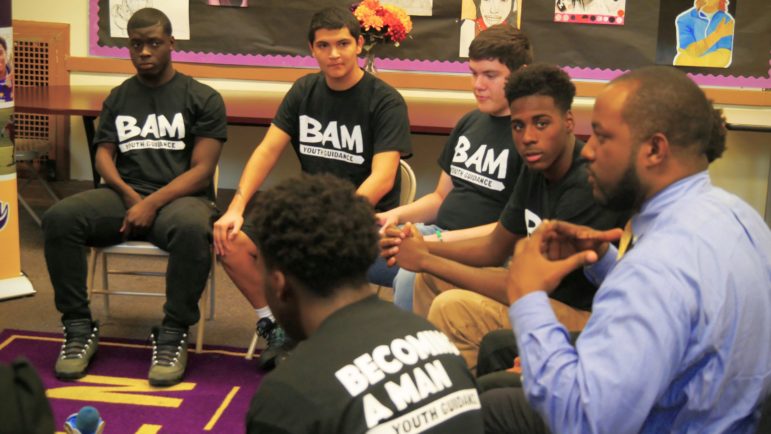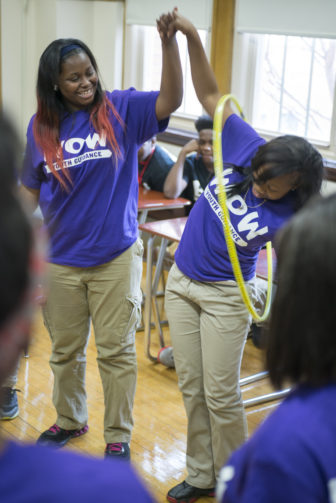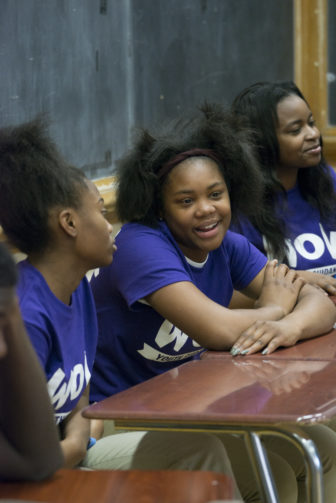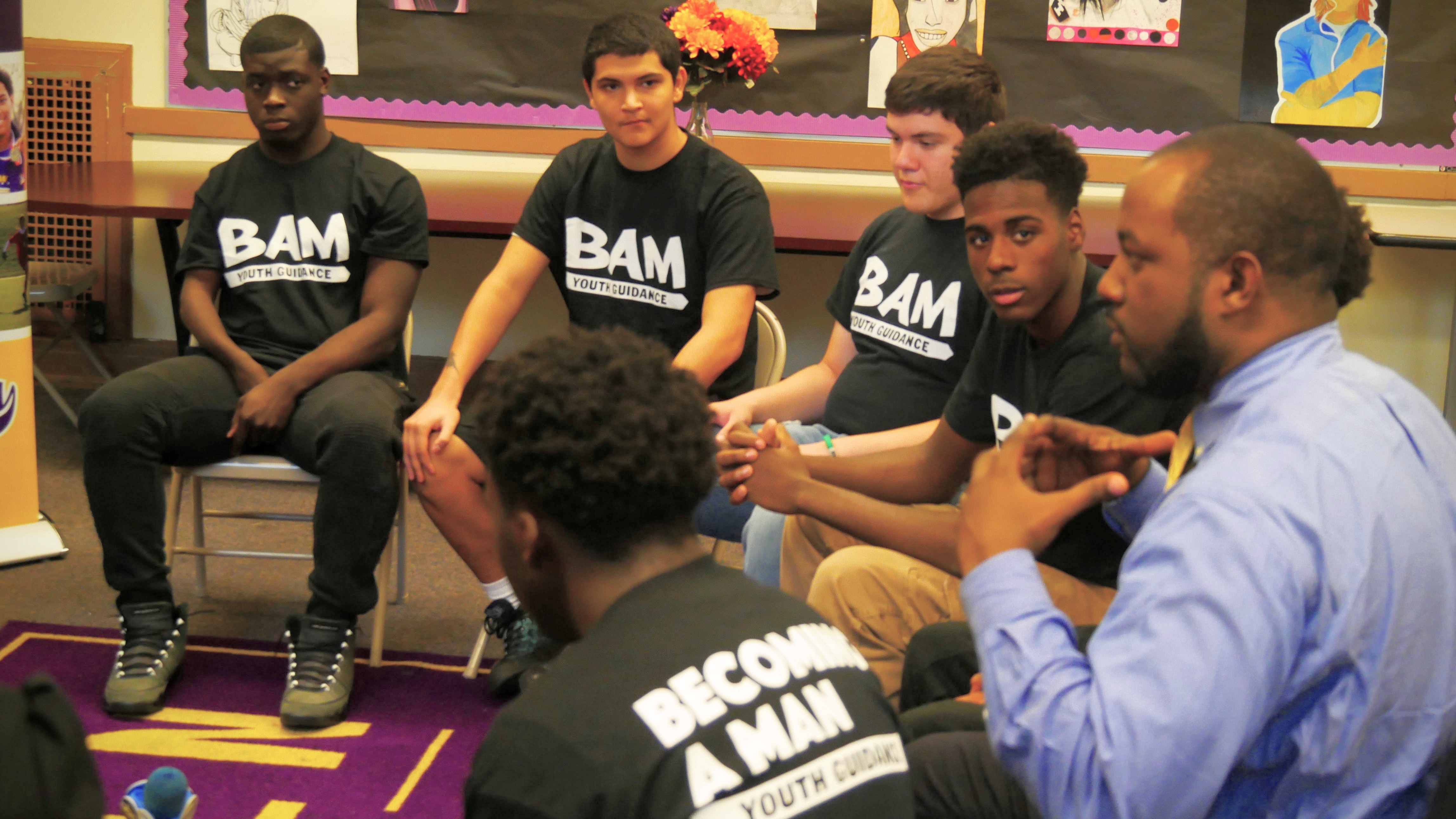
Courtesy of Youth Guidance
Boys at Bowen High School in Chicago take part in a Becoming a Man, a weekly mentoring and counseling circle offered by the nonprofit organization Youth Guidance. Research shows the program significantly reduced violent crime arrests and improved graduation rates.
A major public safety campaign designed to cut crime in Chicago’s most violent neighborhoods relies heavily on mentoring and group work with teens.
Mayor Rahm Emmanuel announced the campaign earlier this fall, saying the city would add about 1,000 law enforcement officers and beef up police training and technology.
But the effort also includes a $36 million public-private initiative to expand the mentoring program Becoming a Man to 7,200 boys and expand a smaller program for girls, Working on Womanhood, to 1,300 girls.
Ultimately the mayor wants to provide a mentor to every eighth- to 10th-grade boy in public school in the city’s 20 most violent communities, as defined by city crime rates.
“The [Becoming a Man] program works by getting kids to physically slow down in high-stakes situations,” said Julia Quinn, research manager at the University of Chicago Crime Lab, which has studied crime prevention since 2008.
Crime Lab research showed that boys who took part in Becoming a Man (BAM) during the 2009-10 school year and the 2013-15 school years were about 50 percent less likely than peers to be arrested for violent crime. Their graduation rate increased 19 percent.
BAM involves “high-quality mentoring,” said Jannie Kirby, spokesperson for Youth Guidance, the Chicago nonprofit that offers both programs.
Boys meet once a week during the school day in a “circle” of about 15 students led by a Youth Guidance-trained counselor. Students can also talk with the counselor at school during the week. They are referred to the program by schools administrators, teachers, parents and others.
SEL support for young men
Last year, Noah, a junior at Roberto Clemente Community Academy in Chicago’s West Town, attended Becoming a Man at the school. His grandmother had died, and he told his Becoming a Man group about her death.
“If I wasn’t in the group I would have kept that inside,” he told “Chicago Tonight,” a PBS show, last winter. “I would have still been hurting today because me and her were really close.”

Nathan Keay
Girls at Hawkins High School in Chicago participate in a team-building activity focused on leadership. Weekly session of Working on Womanhood are offered by Youth Guidance to about 1,000 students in 22 public schools.
“With me in BAM, it taught me how to cope with loss,” he said. “See, I lost a lot of people and I didn’t know how to cope with it.”
Becoming a Man counselors ask the boys to do tasks that may set up a conflict among them and then ask them about their responses. The questions help the boys see they are making certain assumptions.
For example, the counselor pairs the boys, gives one in each pair a ball and tells the other he has 30 seconds to get it away from him. After the scuffling subsides, the counselor points out that no one simply asked for the ball. Through discussion, kids learn to think about various responses.
This standard cognitive behavioral approach is based on the idea that the way people “frame” or think about a situation determines how they feel about it — which determines how they act.
“The programs are literally clinical counseling,” Kirby said. “But it does not look like therapy.”
“The circle is a safe space for them to come together to talk through things that are social and emotional challenges,” she said.
Becoming a Man is offered in schools in south and west Chicago, which is plagued with violence and poverty, and many of the kids have seen or experienced violence, Kirby said.
“The circles give them the opportunity to share,” she said.
Anuj Shah, associate professor of the Booth School of Business at the University of Chicago, was among researchers who evaluated Becoming a Man for the National Bureau of Economic Research.
The kids in the program are not any different from ones growing up in safe neighborhoods, he said. “In violent neighborhoods, it’s more important to reflect on what you’re doing because the rules change from any given moment,” he told PBS.
The program is a blend of several elements, according to Youth Guidance:
- traditional group counseling
- cognitive behavior therapy
- a strengths-based approach
- prevention-based social and emotional learning
- “men’s work,” which is based on challenge, confrontation and ownership of emotional integrity.
Become a Man was founded by Anthony Ramirez-Di Vittorio, who grew up poor in southeast Chicago and became the first in his family to go to college.
In his late 20s, when he was in graduate school studying psychology, Ramirez-Di Vittorio took part in men’s groups that grew out of the work of poet Robert Bly and others.
In an interview published by Thrive Foundation, he told blogger and journalist Rob Waters that a friend encouraged him, saying “we have a lot of lost men” who are suffering in personal relationships.
As a clinical social worker, he began working with boys, forming circles, and talking with them about manhood.
“Is that the kind of man you want to be?” he would ask.
“I called them on their sh** and they loved it and asked for more,” he told Waters.
He led many groups in high school and elementary schools.
The work Ramirez-Di Vittorio was doing became an official program at Youth Guidance in 2003.
In essence, it’s a male responsibility training program, according to Youth Guidance. It teaches boys to own their own emotions instead of placing blame for them elsewhere, according to the organization.
Less mentoring for girls

Nathan Keay
Girls at Hawkins High School in Chicago participate in a team-building activity focused on leadership. Weekly session of Working on Womanhood are offered by Youth Guidance to about 1,000 students in 22 public schools.
The girls’ mentoring program Working on Womanhood (WOW) has not been evaluated by Chicago Crime Lab, but Quinn wants to change that.
“We are very interested in partnering with Youth Guidance to study their program with young women,” she said.
WOW was started in 2011 after school administrators saw how Becoming a Man was working with young men. It now serves more than 1,000 girls in 22 Chicago schools.
Students are referred to the program by teachers, school administrators and parents.
Some of the girls have had a pregnancy. Some are underperforming academically or have gotten into other trouble.
Young women’s coping actions in response to stress differ from those of young men, according to Youth Guidance. The organization points to these indicators:
- 84 percent of WOW students reported five or more lifetime exposures to trauma.
- 82 percent have had someone close to them die.
- 67 percent have been slapped, hit or punched.
- 30 percent have seen someone being shot at or shot with a real gun.
Girls attend the WOW circle once per week for about 30 weeks. They discuss problems, share experiences and take part in goal-setting. Activities include journaling and art therapy.
The city is also looking for additional evidence-based mentoring programs to be incubated at the University of Chicago Crime Lab, according to a statement by the mayor.
The University of Chicago Crime Lab’s research on Becoming a Man continues. Researchers are now analyzing in-person surveys with kids in the program and will release those results in 2017, Quinn said.































